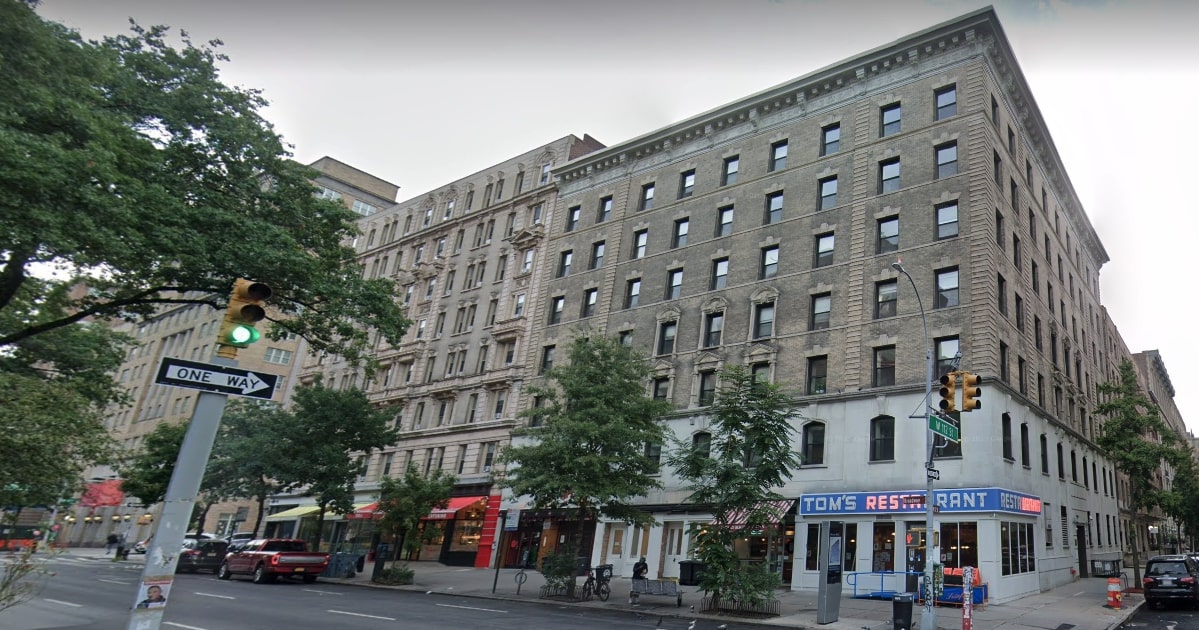
It’s located above Tom’s Restaurant (Google Maps)
Free Upper West Side News, Delivered To Your Inbox
After nearly 60 years on the Upper West Side, a quiet yet globally impactful hub of climate science is being uprooted—suddenly and with little clarity about what comes next.
Advertisement
More than 100 employees at NASA’s Goddard Institute for Space Studies (GISS), located above Tom’s Restaurant at West 112th and Broadway, have been told to vacate their offices by the end of May, the New York Times reports. Since 1966, the institute has occupied Columbia University’s Armstrong Hall–above the diner made famous by Seinfeld–conducting research on everything from Earth’s warming climate to the atmospheres of distant planets.
The move, federal officials say, is part of a broader cost-cutting initiative ordered by the Trump administration, aimed at reevaluating leased federal office space—particularly in high-cost urban areas. But critics argue the eviction may do the opposite of what it intends.
The $3 million annual lease for the 43,000-square-foot space hasn’t been terminated in practice, because it’s not NASA footing the bill—it’s the General Services Administration, a separate federal agency. Columbia University confirms that the rent is still being paid. In effect, taxpayers may be covering an empty building, while the researchers are left scrambling.
“There is no logic behind this,” Kostas Tsigaridis, a GISS scientist and Columbia faculty member, told the Times. Others echoed the sentiment, pointing to recent investments NASA made in upgrading the facility—including a new conference room—and the disruption now underway. Furniture and decades of research materials are being boxed up and hauled to storage in New Jersey.
Advertisement
NASA officials say staff will temporarily shift to remote work while a new location is secured, which one onsite scientist we spoke with fears will have a negative impact on essential teamwork and collaboration. Meanwhile, Columbia is exploring alternative space to keep some of the scientists nearby, many of whom also teach at the university.
The uncertainty has stung. Researchers worry the move could fracture teams and slow progress. Amid broader funding cuts to climate and equity-related research, some fear this is part of a larger trend.
“Whatever the rationale,” said one longtime staffer, “the cost isn’t just financial. It’s human. It’s scientific. And it’s real.”
Have a news tip? Send it to us here!



This was never about cutting costs, they are literally doing the opposite, as is the Republican way, and especially the multiple bankruptcy orange baby way.
Probably part of the broader effort to kill climate change research.
This is terrible business practice and terrible in every other way. Is there no program the President’s administration can leave functional??!!!!!
The article quotes someone as saying there’s no rationale for the move. There is a rationale: The Trump Administration doesn’t want research on climate change.
I always thought that there were at least two sides to every story.
And?
Not on the Upper West Side.
When will we accept and then take action against an impaired individual who sits in the West Wing and is attempting to commandeer the country as part of his grift and graft partnership with the Republican party, the Supreme Court and the Justice Department? And the pathetic deflection moving the argument to Biden’s infirmities does not override nor address the current president’s vindictive and venomous behavior toward almost anyone who crosses his path. Notice a single soul from his previous administration serving in any capacity whatsoever? What does that tell you? Just Supreme Court justices who take expense-paid vacations on billionaires’ jets and have no compunction to declare such trips and/or ask for clearance given the obvious conflict of interest and ethical duplicity suggested by taking advantage of such gifts (payola, anyone?) on a regular basis.
This is just political revenge – moving jobs from democratic enclaves to red states. They will simply try to staff Huntsville and but lose the good staff to private companies which further helps their private sector buddies.
$3,000,000 for 43,000 square feet is $68/sq ft per year. Yikes!
Another demolition derby day in the trump admin. They dont know what they are doing. they are just lopping off heads because it’s fun.
Just another example of the thoughtless impact the Trump administration is having. No true reason for obliterating these programs a destroying people’s lives. Certainly cost cutting is not the reason, not with spending 90 million dollars (maybe more or less) on a useless military parade. Sometimes I think they are just destroying everything run by people who did not vote for Trump. To Trump that’s the best reason to take down the country.
The whole Trump experience in a nutshell.
crazy
Fuck Trump.